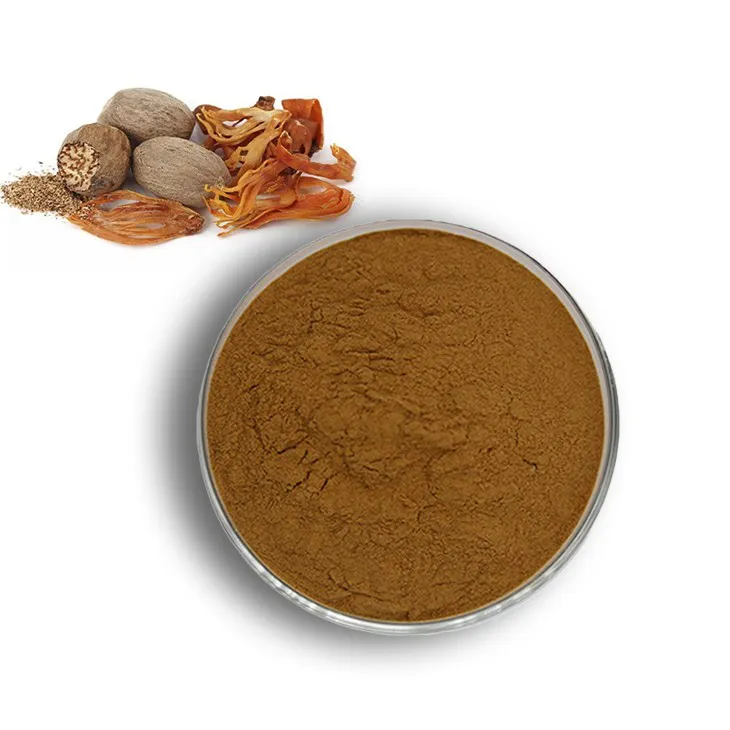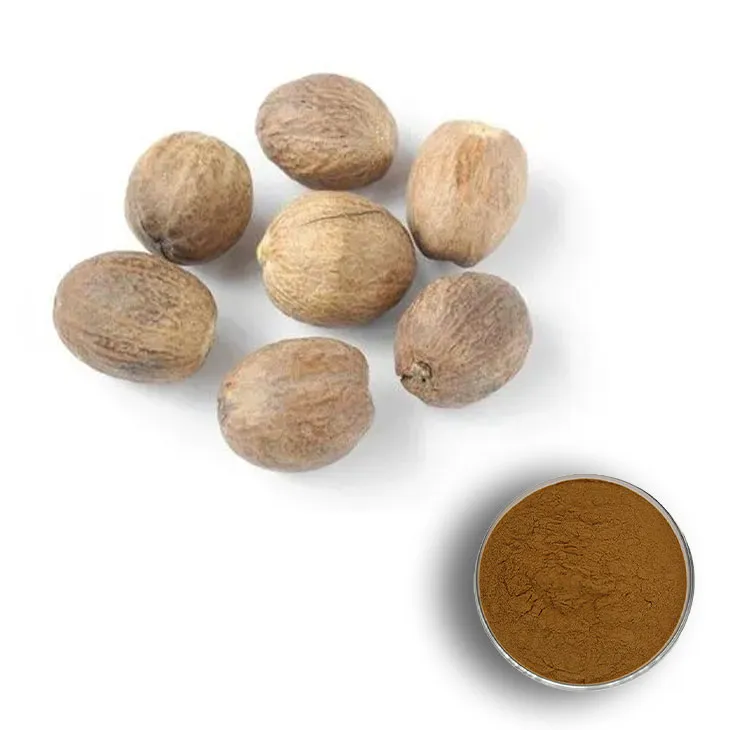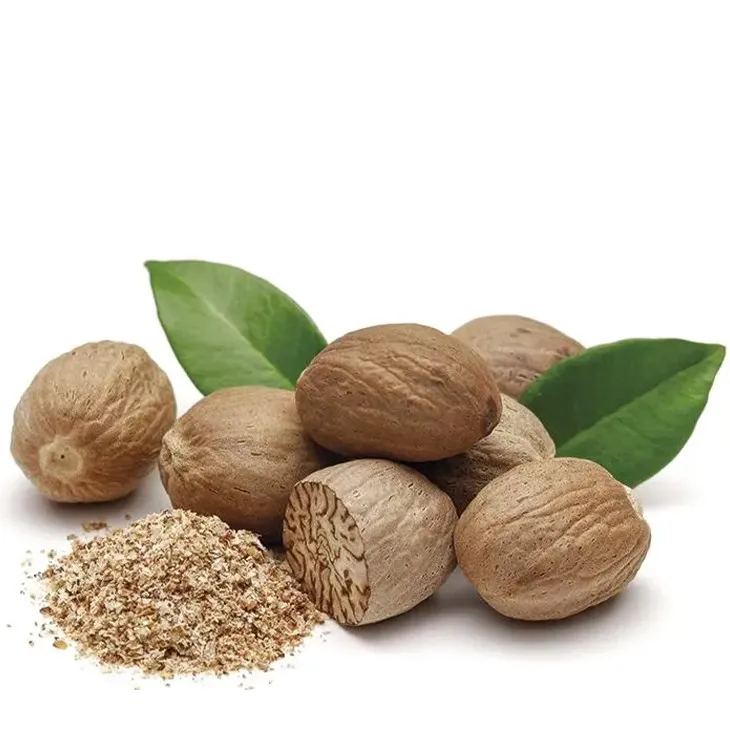- 0086-571-85302990
- sales@greenskybio.com
Use nutmeg extract? Make sure you source from sustainable suppliers!
2024-12-13

Introduction
Nutmeg Extract has long been used as a meat tenderizer, among other applications. It imparts a unique flavor and has certain enzymatic properties that help in breaking down the proteins in meat, making it more tender. However, in recent years, the focus has shifted towards not just the functionality of Nutmeg Extract but also the origin and the way it is sourced. Sustainable sourcing has become a crucial factor that consumers, producers, and regulatory bodies are increasingly concerned about.

What is Nutmeg Extract?
Nutmeg extract is derived from the nutmeg seed, which comes from the nutmeg tree (Myristica fragrans). The tree is native to the Banda Islands in Indonesia but is now also cultivated in other tropical regions such as Grenada and India. The extract contains various compounds, including essential oils, phenolic compounds, and enzymes. These components are responsible for its characteristic flavor, aroma, and tenderizing effects. For instance, the enzymes in nutmeg extract can start the hydrolysis of collagen in meat, which is a major protein that contributes to the toughness of meat.

The Environmental Impact of Nutmeg Production
1. Deforestation
In some areas, the expansion of nutmeg plantations has led to deforestation. As the demand for nutmeg increases, farmers may clear natural forests to make way for new plantations. This not only destroys the habitats of many native species but also contributes to soil erosion and a loss of biodiversity. For example, in Indonesia, some illegal logging has been associated with the expansion of nutmeg cultivation, which has had a negative impact on the unique ecosystems of the Banda Islands.
2. Water Usage
Nutmeg trees require a significant amount of water, especially during the growing season. In regions where water is scarce, large - scale nutmeg production can put a strain on water resources. Moreover, improper irrigation practices can lead to water wastage and soil salinization. This is a particular concern in areas where water management systems are not well - developed.
3. Pesticide and Fertilizer Use
To protect nutmeg crops from pests and diseases and to enhance their growth, farmers often use pesticides and fertilizers. However, the overuse or improper use of these chemicals can have several negative consequences. Pesticides can contaminate the soil, water, and air, harming non - target organisms such as beneficial insects, birds, and soil microorganisms. Fertilizers, on the other hand, if not used properly, can leach into water bodies, causing eutrophication, which is the excessive growth of algae and other aquatic plants, leading to a decline in water quality.

Ethical Considerations in Nutmeg Sourcing
1. Fair Trade
When sourcing nutmeg extract, fair trade practices are of utmost importance. Many nutmeg farmers in developing countries are small - scale producers who rely on the income from nutmeg sales. However, they are often at the mercy of middlemen and large - scale buyers who may not offer fair prices. Fair trade initiatives ensure that farmers receive a reasonable price for their produce, which helps to improve their living standards and support the local economy. For example, fair trade certification guarantees that a certain percentage of the price paid by consumers goes directly to the farmers, enabling them to invest in better farming practices, education, and healthcare for their families.
2. Labor Conditions
Another ethical aspect to consider is the labor conditions on nutmeg plantations. In some regions, there have been reports of poor working conditions, including long hours, low wages, and lack of proper safety equipment for workers. Ensuring that nutmeg is sourced from plantations that adhere to good labor practices is essential. This includes providing fair wages, reasonable working hours, and a safe working environment for all workers, regardless of their gender or ethnicity.

Quality Assurance in Sustainable Sourcing
1. Traceability
One of the key elements of sustainable sourcing of nutmeg extract is traceability. This means being able to track the nutmeg from the farm where it was grown to the final product on the store shelf. Traceability helps in several ways. Firstly, it allows consumers to know exactly where their nutmeg extract comes from, which gives them confidence in the product's origin and the sustainability of its production. Secondly, it enables producers to identify and address any issues in the supply chain, such as quality control problems or unethical practices at a particular farm. For example, if a batch of nutmeg extract is found to be contaminated, traceability can help to quickly pinpoint the source of the problem and take appropriate action.
2. Organic Certification
Organic certification is also an important aspect of quality assurance in sustainable nutmeg sourcing. Organic nutmeg is grown without the use of synthetic pesticides and fertilizers, which not only reduces the environmental impact but also ensures that the final product is free from chemical residues. Organic farming methods also promote soil health and biodiversity on the nutmeg plantations. Consumers are increasingly interested in purchasing organic nutmeg extract, as they are more conscious about the potential health risks associated with chemical - laden products.
Benefits of Sourcing from Sustainable Suppliers
1. Environmental Conservation
By sourcing nutmeg extract from sustainable suppliers, we contribute to environmental conservation. Sustainable suppliers are more likely to implement practices that reduce deforestation, conserve water, and minimize the use of pesticides and fertilizers. For example, they may use agroforestry techniques, where nutmeg trees are planted in combination with other native trees, creating a more diverse and sustainable ecosystem. This helps to protect the natural habitats of wildlife, maintain soil fertility, and reduce the overall environmental footprint of nutmeg production.
2. Social and Economic Benefits
Sourcing from sustainable suppliers also has significant social and economic benefits. As mentioned earlier, fair trade practices associated with sustainable sourcing ensure that farmers receive a fair price for their nutmeg. This, in turn, helps to improve the living standards of farming communities. Moreover, sustainable nutmeg production can create more stable employment opportunities in rural areas, as it promotes long - term and responsible farming practices. It also encourages local economic development by investing in infrastructure and community services in the nutmeg - producing regions.
3. Reputation and Consumer Trust
For businesses, sourcing nutmeg extract from sustainable suppliers can enhance their reputation and gain consumer trust. In today's market, consumers are more likely to support companies that are committed to sustainable and ethical practices. By ensuring that their nutmeg supply is sustainable, companies can differentiate themselves from their competitors and attract environmentally and socially conscious consumers. This can lead to increased brand loyalty and ultimately, better business performance.
Challenges in Sourcing Sustainable Nutmeg Extract
1. Cost
One of the main challenges in sourcing sustainable nutmeg extract is the cost. Sustainable production methods often require more investment in terms of environmental protection measures, fair trade compliance, and quality control. This can lead to higher prices for sustainable nutmeg extract compared to conventionally sourced products. For small - scale producers or businesses with tight budgets, this cost difference can be a significant barrier to switching to sustainable sourcing.
2. Limited Availability
Currently, the availability of sustainable nutmeg extract may be limited. Although the demand for sustainable products is growing, the supply chain for sustainable nutmeg is still in the development stage in many regions. This can make it difficult for businesses to source sufficient quantities of sustainable nutmeg extract, especially if they have large - scale production requirements.
3. Certification Complexity
The process of obtaining and verifying sustainable certifications can be complex. There are multiple certification standards for sustainable nutmeg production, such as fair trade, organic, and sustainable forestry certifications. Each standard has its own set of requirements and auditing procedures, which can be confusing for producers and suppliers. Moreover, the cost and time involved in obtaining these certifications can be a deterrent for some small - scale producers.
Conclusion
Nutmeg extract is a valuable ingredient with various applications, especially as a meat tenderizer. However, the importance of sustainable sourcing cannot be overstated. Considering the environmental impact, ethical considerations, and quality assurance aspects, it is essential that we source nutmeg extract from sustainable suppliers. Although there are challenges in doing so, such as cost, limited availability, and certification complexity, the benefits in terms of environmental conservation, social and economic development, and reputation building are significant. As consumers become more aware of these issues, the demand for sustainable nutmeg extract is likely to increase, which will hopefully drive more suppliers to adopt sustainable practices in the future.
FAQ:
Question 1: What is nutmeg extract?
Nutmeg extract is a substance derived from the nutmeg seed. It contains various compounds that can be used for different purposes, such as in cooking for flavoring or in some traditional medicine practices for its potential health - related properties.
Question 2: Why is sustainable sourcing of nutmeg extract important?
Sustainable sourcing of nutmeg extract is crucial for several reasons. Firstly, from an environmental perspective, it helps to protect the natural habitats where nutmeg trees grow. Unsustainable harvesting can lead to deforestation and loss of biodiversity. Secondly, in terms of ethical considerations, it ensures that the farmers and workers involved in the production are treated fairly and paid appropriately. Also, sustainable sourcing often leads to better quality assurance as it promotes proper cultivation and harvesting methods.
Question 3: How can one identify a sustainable supplier of nutmeg extract?
One can identify a sustainable supplier of nutmeg extract in several ways. Look for certifications such as Fairtrade, which indicates that the farmers are getting a fair deal. Also, check if the supplier adheres to environmental standards like sustainable forestry management. A good supplier may also be transparent about their sourcing process, providing information on where the nutmeg is sourced from, how it is cultivated and harvested, and how they support the local communities.
Question 4: What are the environmental impacts of non - sustainable nutmeg extraction?
Non - sustainable nutmeg extraction can have severe environmental impacts. It may lead to over - harvesting of nutmeg trees, which can cause deforestation. This in turn can disrupt ecosystems, leading to a loss of habitats for many species. It can also contribute to soil erosion as the natural cover provided by the trees is removed, and may affect water cycles in the area.
Question 5: Does sustainable sourcing affect the quality of nutmeg extract?
Yes, sustainable sourcing can positively affect the quality of nutmeg extract. When nutmeg is sourced sustainably, it is more likely to be properly cultivated and harvested at the right time. This can result in a higher - quality extract with better flavor and more consistent chemical composition. Sustainable farming practices may also involve fewer pesticides and chemicals, which can further enhance the purity and quality of the extract.
Related literature
- Sustainable Sourcing of Spices: A Review"
- "The Importance of Sustainable Agriculture in Spice Production"
- "Ethical and Sustainable Sourcing in the Food Industry: The Case of Nutmeg"
- ▶ Hesperidin
- ▶ Citrus Bioflavonoids
- ▶ Plant Extract
- ▶ lycopene
- ▶ Diosmin
- ▶ Grape seed extract
- ▶ Sea buckthorn Juice Powder
- ▶ Fruit Juice Powder
- ▶ Hops Extract
- ▶ Artichoke Extract
- ▶ Mushroom extract
- ▶ Astaxanthin
- ▶ Green Tea Extract
- ▶ Curcumin
- ▶ Horse Chestnut Extract
- ▶ Other Product
- ▶ Boswellia Serrata Extract
- ▶ Resveratrol
- ▶ Marigold Extract
- ▶ Grape Leaf Extract
- ▶ New Product
- ▶ Aminolevulinic acid
- ▶ Cranberry Extract
- ▶ Red Yeast Rice
- ▶ Red Wine Extract
-
Natural grape seed extract
2024-12-13
-
Bilberry Extract
2024-12-13
-
Citrus Aurantium Extract
2024-12-13
-
Carrageenan Extract Powder
2024-12-13
-
Tinospora cordifolia extract
2024-12-13
-
Red Vine Extract
2024-12-13
-
Panax Ginseng Leaf Extract
2024-12-13
-
Black Pepper Extract
2024-12-13
-
Plantain extract
2024-12-13
-
Troxerutin
2024-12-13





















